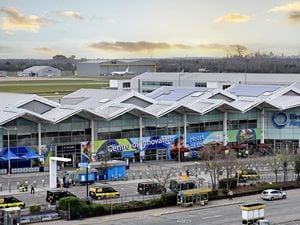Farmers stay vigilant as record avian flu outbreak sees 48m birds culled
The boss of a West Midlands poultry business says farmers are doing all they can to protect livestock from the threat of avian flu.

Elwyn Griffiths, of Oaklands Farm Eggs, near Wem, said it is vital birds are kept safely under cover to protect them from wildlife as it is a "lottery" as to where it will appear.
It comes as around 48 million birds have been culled across the UK and the EU in the last year as a result of the largest outbreak of avian flu on record.
In the UK, 161 cases of highly pathogenic avian influenza (HPAI) were detected in poultry and captive birds, leading to the culling of 3.2 million birds. That is compared to the previous record of 26 cases in 2020/21.
Cases have been reported in the West Midlands, at Stubbers Green in Aldridge and at Chasewater Country Park in Staffordshire.
“The British Lion code of practice has introduced new measures to help guide farmers in the protection of their flocks against avian influenza," said Mr Griffiths.
"Farmers are aware of all bio-security measures and are doing everything they can to protect their flocks.
"Farms have been closed when the problem occurs but it is like a lottery as to where avian influenza will crop up and appear.
"We have to keep getting more messages across to backyard flock keepers about keeping their birds safely under cover and protect them from wildlife.
"As with our advice regarding Covid to stay at home, the birds need to be shut inside for their protection. Shutting birds away, by putting them in the barn, is the safest way to keep birds and protect them from avian influenza.”
Shropshire poultry farmer and NFU poultry board chair James Mottershead said the poultry sector has experienced a very difficult year in regard to the threat of avian influenza.
"The Chief Veterinary Officer has now deemed the threat to be low for poultry exposure to HPAI H5 in Great Britain, but outbreaks can still occur, and farmers are remaining vigilant," he said.
“Maintaining good bio-security measures is important for all bird keepers, whether you are a commercial farmer or someone who keeps a small number of hens in the garden.
“The Government has provided funding for research into avian influenza which we hope will help us understand more about the disease and how we can prevent it, and ultimately put bird keepers in a better position to protect their flocks.
"We want to work with the Government to minimise the impacts of any future outbreaks of avian influenza so that we do not experience another year like this one.”
Bird flu as well as living costs have also sparked warnings from farming groups that there could be a shortage of turkeys for Christmas dinners this year.
Around 10 million turkeys are eaten in the UK each Christmas, but increased production costs are making it harder for farmers to rear them.
Mr Mottershead added: “Turkey producers are working hard to maintain production in the face of avian influenza as well as soaring energy and input costs, to ensure there remains an ample supply of British turkeys this Christmas."
The UK Government said the culled birds were a "small proportion" of total production – about 20 million birds a week.
There have also been 1,727 cases of avian flu in the UK's wild bird population, in 406 locations involving 59 bird species.
In the last 12 months cases have been reported in the region including at Stubbers Green and at Chasewater.
2 Sisters Food Group, which has chicken processing factories in West Bromwich and Wolverhampton, said the company wasn't facing any significant issues at the moment, given the very large volume it has across England, Wales and Scotland.





